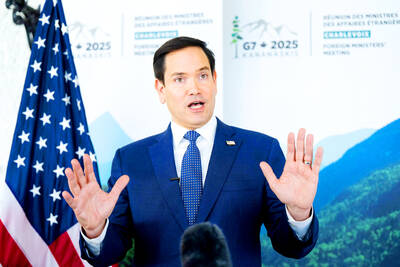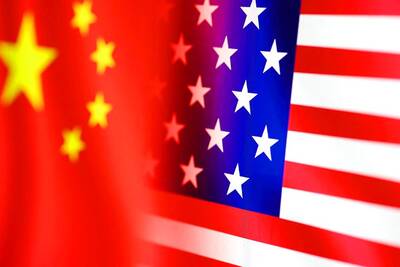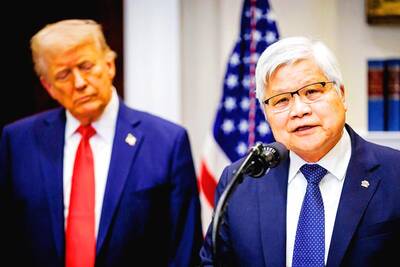The first ever international bone marrow transplant between non-relatives and the country, in which a Vietnamese patient received the bone marrow of a Taiwanese donor, has been completed successfully, doctors at National Taiwan University Hospital (NTUH) announced yesterday.
Chen Yao-chang (
The 27-year-old Vietnamese patient, Huynhn Thanh Thuan, was diagnosed with acute myelogenous leukemia -- a cancer of the blood-forming tissues of the bone marrow -- in January after suffering from headaches and a high fever.
With this type of leukemia, bone marrow failure occurs as malignant cells gradually replace the normal bone marrow, Chen said.
Thuan, himself a doctor, began chemotherapy at the Blood Transfusion Hematology Hospital in Ho Chi Minh City, but could not find a matching bone marrow tissue type among his family and relatives.
Bone marrow is usually donated by a person whose tissue has the same genetic type as the patient needing the transplant. If no one in the recipient's family has the same tissue type, then the databases of the national bone marrow registry are checked for a tissue type match, doctors said.
Since NTUH doctors had helped the Vietnamese hospital establish its center for bone marrow transplants between 1993 and 1995, Thaun's doctors suggested that he seek the help of NTUH doctors in Taiwan.
Thanks to the help of the Vietnamese branch of the Tzu-chi Buddhist Compassionate Relief Foundation, Thuan was then transferred to NTUH in May to continue his treatment.
At about the same time a partial match from non-relative tissue was found using the foundation's Taiwanese bone marrow registry.
Partial matches can be risky but a complete tissue match is not necessarily required to conduct a successful transplant, Chen said.
Thuan then agreed to the transplant on Aug. 24.
Chen said that Thuan had successfully passed the 100-day observation period during which infections are most likely to occur.
Previously, non-relative bone marrow transplants had a 50 percent risk of triggering tissue rejection, but with improved anti-rejection drugs, the risks are now down to between 10 and 20 percent, Chen said.
Rejection symptoms can include infections or complications of the skin and liver, he said.
Yao Ming (
Thuan, who was at the conference, said that he was very lucky to have found a donor in Taiwan since he understood how low the possibilities of a tissue match were.
Chen said that with the bone marrow registry in Taiwan, tissue matches are found approximately 60 percent of the time for Chinese blood because of genetic factors, but as Thuan was Southeast Asian, this brought the percentage down to only around 10 percent.
"Thuan was extremely lucky to find a donor here in Taiwan, and for us, it is the first ever successful international non-relative bone marrow transplant," Chen said.
According to international regulations, the age and sex of the bone marrow donor and the time that the donation was made cannot be revealed until one year after the donation is made, Chen said.

‘CROWN JEWEL’: Washington ‘can delay and deter’ Chinese President Xi Jinping’s plans for Taiwan, but it is ‘a very delicate situation there,’ the secretary of state said US President Donald Trump is opposed to any change to Taiwan’s “status quo” by force or extortion and would maintain that policy, US Secretary of State Marco Rubio told the Hugh Hewitt Show host on Wednesday. The US’ policy is to maintain Taiwan’s “status quo” and to oppose any changes in the situation by force or extortion, Rubio said. Hewitt asked Rubio about the significance of Trump earlier this month speaking with Taiwan Semiconductor Manufacturing Co (台積電) chairman C.C. Wei (魏哲家) at the White House, a meeting that Hewitt described as a “big deal.” Asked whether the meeting was an indication of the

‘RELATIVELY STRONG LANGUAGE’: An expert said the state department has not softened its language on China and was ‘probably a little more Taiwan supportive’ China’s latest drills near Taiwan on Monday were “brazen and irresponsible threats,” a US Department of State spokesperson said on Tuesday, while reiterating Washington’s decades-long support of Taipei. “China cannot credibly claim to be a ‘force for stability in a turbulent world’ while issuing brazen and irresponsible threats toward Taiwan,” the unnamed spokesperson said in an e-mailed response to media queries. Washington’s enduring commitment to Taiwan will continue as it has for 45 years and the US “will continue to support Taiwan in the face of China’s military, economic, informational and diplomatic pressure campaign,” the e-mail said. “Alongside our international partners, we firmly

KAOHSIUNG CEREMONY: The contract chipmaker is planning to build 5 fabs in the southern city to gradually expand its 2-nanometer chip capacity Taiwan Semiconductor Manufacturing Co (TSMC, 台積電), the world’s biggest contract chipmaker, yesterday confirmed that it plans to hold a ceremony on March 31 to unveil a capacity expansion plan for its most advanced 2-nanometer chips in Kaohsiung, demonstrating its commitment to further investment at home. The ceremony is to be hosted by TSMC cochief operating officer Y.P. Chyn (秦永沛). It did not disclose whether Premier Cho Jung-tai (卓榮泰) and high-ranking government officials would attend the ceremony. More details are to be released next week, it said. The chipmaker’s latest move came after its announcement earlier this month of an additional US$100 billion

Authorities yesterday elaborated on the rules governing Employment Gold Cards after a US cardholder was barred from entering Taiwan for six years after working without a permit during a 2023 visit. American YouTuber LeLe Farley was barred after already being approved for an Employment Gold Card, he said in a video published on his channel on Saturday. Farley, who has more than 420,000 subscribers on his YouTube channel, was approved for his Gold Card last month, but was told at a check-in counter at the Los Angeles International Airport that he could not enter Taiwan. That was because he previously participated in two